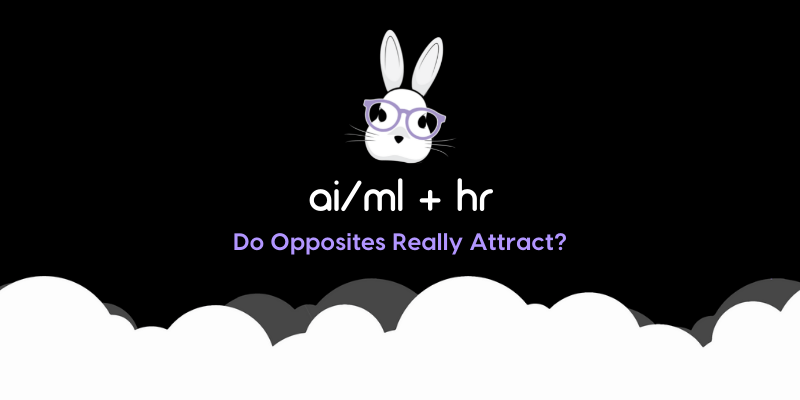AI/ML + HR: Do Opposites Really Attract?

Attracting, hiring, and retaining people is at the core of a successful human resources department, and it has always been a deeply “human” activity. Looking back at my career, when I think of the very best human resources managers I have worked with, they have all excelled in traits that we humans think only we possess–empathy, emotional intelligence, morality, ethics, and judgment.
Logically, it would seem that this department would benefit very little from machine learning and artificial intelligence–that type of intelligence delivered by servers and silicon over an internet connection by Jeff Bezos from an inhuman data center. Although I love my new MacBook, I would never think that it is looking out for my best interest, nor is it empathizing with the daily challenges of human life.
Machine learning can help automate HR tasks
However, when you actually start to look at the job functions of your HR Department, you soon realize that they often deal with tasks that don’t require uniquely human traits. For example, signing new employees up for insurance, payroll, and other benefits don’t usually require much judgment, and it would not be hard to imagine a computer fulfilling these tasks. But some skills have, until now, been strictly the domain of humans, and hiring great people is probably at the top of that list.
“Hiring” is a broad term though, and in my definition, includes attracting, screening, testing, interviewing, assessing compensation, and, eventually, making an employment offer. Out of all of these steps, screening, testing, and interviewing candidates are probably the three most time-consuming tasks in the hiring process. Even in the low unemployment market we have enjoyed for over a decade, going through resumes, job applications, conducting phone screenings, administering tests, and other such activities have been enormously time-consuming.
> Read more: The NerdHerder Experience
On the surface, the massive layoffs due to COVID-19 would seem to make an HR manager’s job easier, with thousands of experienced people on the job market, all eager to find new opportunities. Where now, there is almost certainly a perfect candidate available, only two short months ago, some technical jobs had 0% unemployment.
However, now the opposite may be true. Today, the HR department has to figure out how to sift through enormous amounts of data on those millions of people to find that needle in the haystack. This then leads us to think that maybe it really was easier when there were only three candidates to choose from.

Applicant tracking systems have used ML for years
Large companies have been using machine learning and artificial intelligence to screen resumes for years, and the new flood of potential applicants will likely increase the use of these automated applicant tracking systems (ATS). ATS solutions often have built-in computer algorithms to look at resumes and screen out candidates that don’t appear to be a fit based on predefined rules or keywords.
The benefits of this are obvious. The promise of the automated ATS is to allow HR professionals to only see the resumes of people with the right skill sets, and potentially reduce bias in the hiring process. However, these systems are far from perfect. If the filters are too stringent, the best candidates might get screened out. And if the filters are too basic, HR may still have thousands of “screened” resumes to sort through manually.
> Read more: Are You Ready to Move to the Cloud?
Further increasing the overload, candidates now submit resumes to hundreds of open jobs with only a few seconds of looking at the actual job description, and with this, the applicant may not even want the job if given the opportunity. Moreover, with the knowledge of how these ATS work, resumes are often littered with buzz-words in hopes of making it past the computer gate-keeper.
Somewhat like the battle between hackers and security administrators, one person continues to try new things to get through, while, in conjunction, the computer programs are trying to learn enough to stop them. The more attempts they can make by flooding the system with resumes, the better chance they have to get an interview.
The coming HR revolution
In the end, it seems like we are right back to where we started. HR departments still have a huge list of resumes to go through manually and need to make a decision they feel that only a human can make: who is really qualified for this role?
New companies, like NerdRabbit, are attacking this problem using the latest machine learning technologies that don’t just look at the words written on a resume. We think that in the next few years, we will see a total upheaval in traditional HR practices. Just like Amazon changed the way the world shops, startups like NerdRabbit may change the way the world hires. Sign up at nerdrabbit.com to follow our vision for the future of hiring.

Related articles
Cloud Migration: Nerdly Select vs. DIY – Which Path Is Right for Your Business?
The global business landscape is rapidly migrating to the cloud as organizations are finding new ways to reduce operational expenses with digital transformation. The cloud offers unparalleled flexibility, cost-efficiency, and boundless opportunities for innovation. As...
Multi-Cloud vs. Hybrid Cloud: Which One is Right for Your Business?
We often see discussions of cloud transformation framed as on-premises vs. cloud, but the reality is a bit more nuanced than that. The fact is, you have multiple options when it comes to how your organization will use the cloud, with two of the most popular being...
Data Center Migration to AWS: What You Need to Know
Originally published April 27, 2022 If you haven’t already started your data center migration to AWS, it’s time to start thinking about it. Over 9 million websites use AWS and reap the benefits of its advanced cloud computing capabilities. In this article, we’ll cover...







